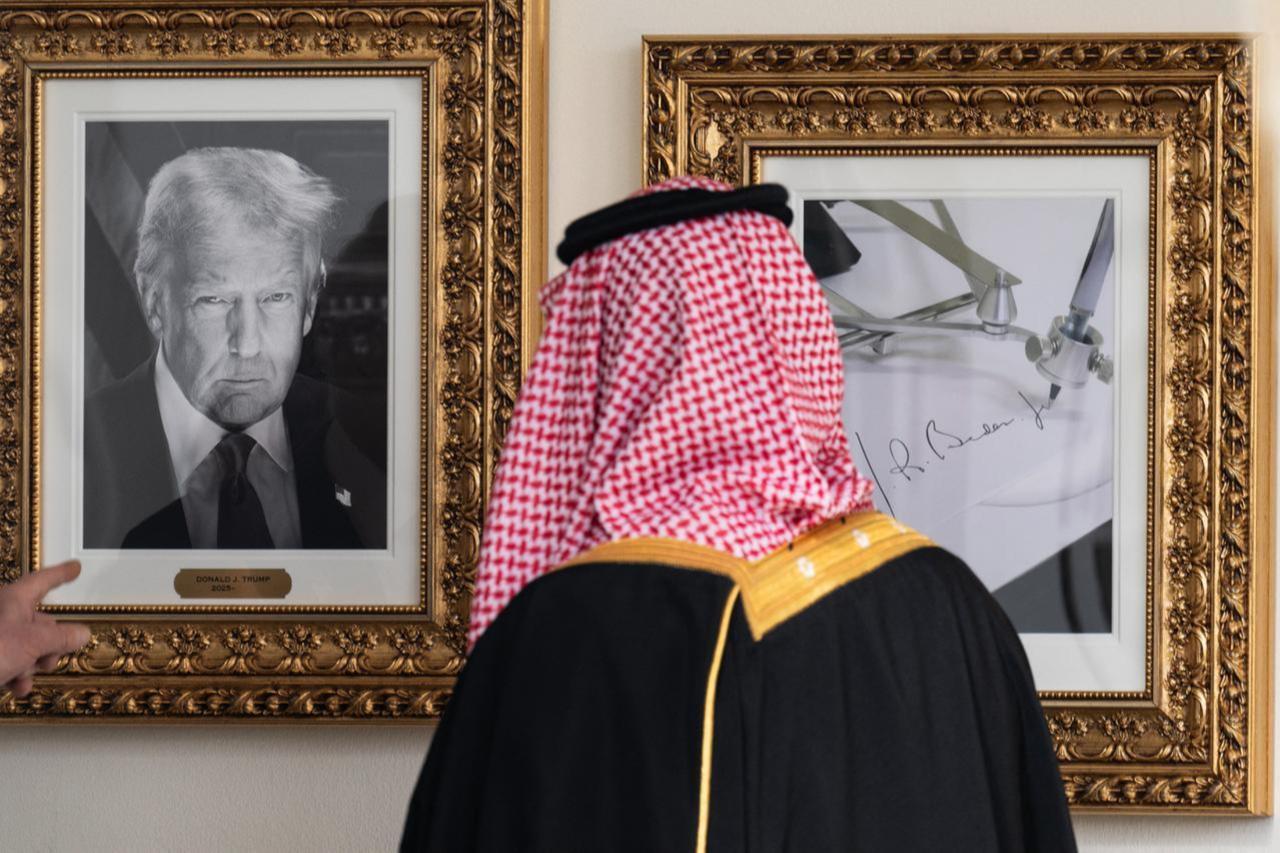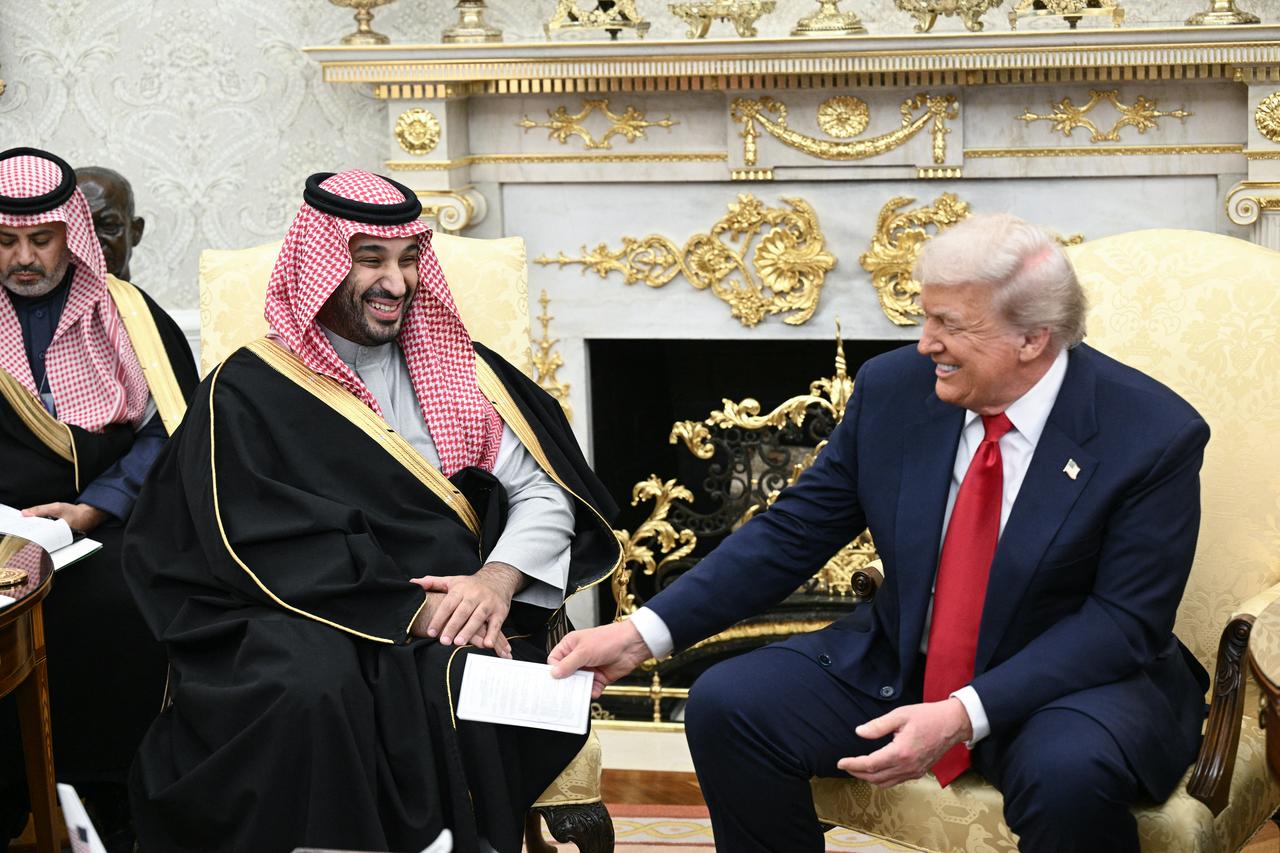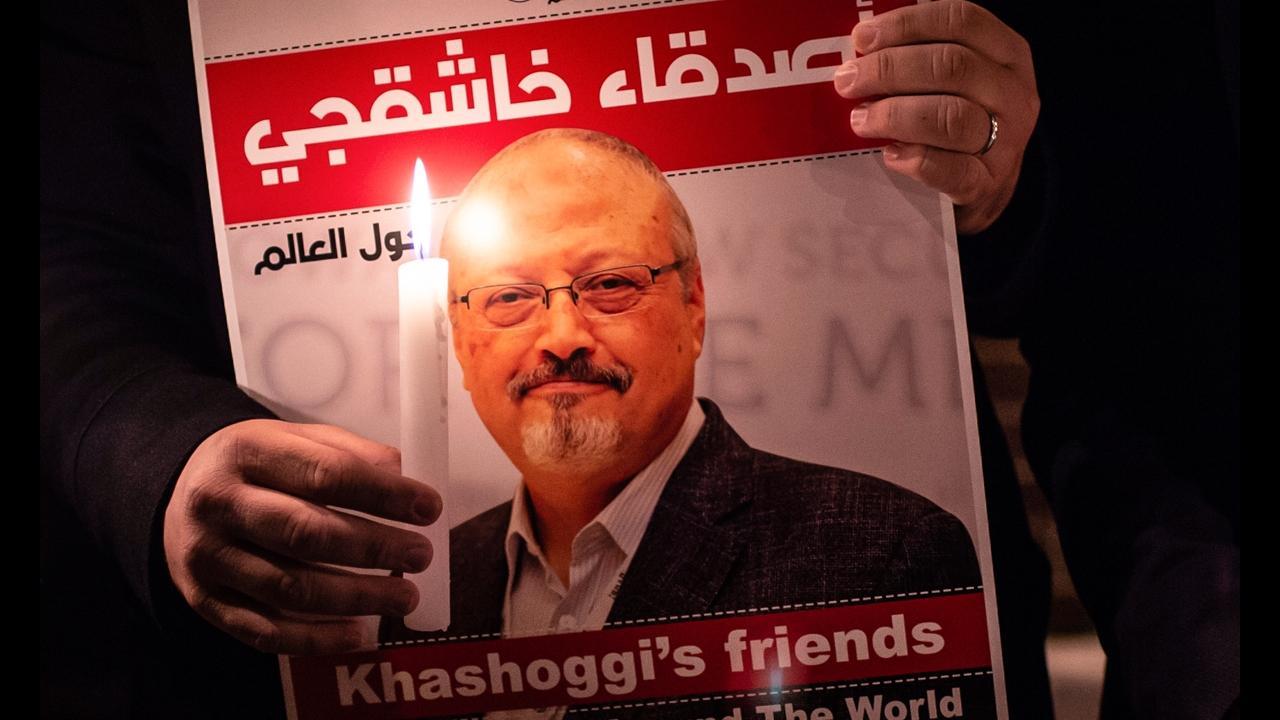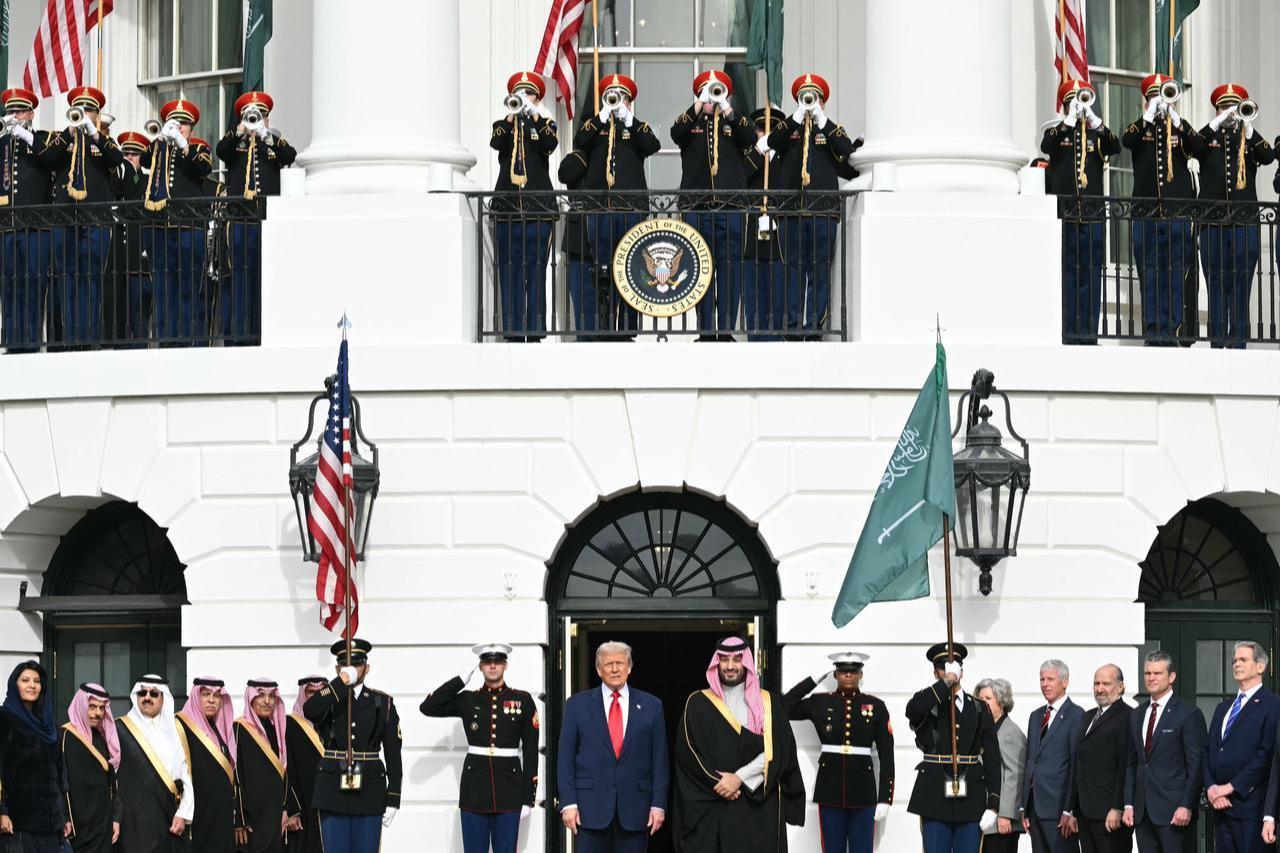
U.S. President Trump defended Saudi Crown Prince Mohammed bin Salman during an Oval Office meeting Tuesday, describing slain journalist Jamal Khashoggi as "extremely controversial" while the Saudi leader acknowledged the 2018 murder was a mistake but offered no acceptance of responsibility.
"You're mentioning somebody that was extremely controversial," Trump told reporters when asked about Khashoggi's killing during the crown prince's visit. "A lot of people didn't like that gentleman that you're talking about, whether you like him or didn't like him, things happened, but he knew nothing about it," the president added, referring to Prince Mohammed.
The crown prince, speaking publicly about the murder during the White House meeting, said the killing by Saudi agents was "painful and it's a huge mistake, and we are doing our best that this doesn't happen again." His remarks stopped short of accepting personal responsibility for an operation that U.S. intelligence concluded he approved.
The exchange came as Trump welcomed the Saudi leader with an elaborate military ceremony that exceeded typical protocol for foreign dignitaries, complete with mounted officers carrying flags and F-35 fighter jets screaming overhead in formation—the same advanced aircraft Trump pledged Monday to sell the kingdom.
Trump's comments directly contradicted a 2021 U.S. intelligence assessment that concluded Prince Mohammed "approved an operation in Istanbul, Türkiye, to capture or kill" the Washington Post columnist. The Biden administration released that report after determining the crown prince fostered an environment where aides would not undertake such sensitive actions without his approval. Saudi officials rejected those findings as "a negative, false and unacceptable assessment."

The declassified intelligence assessment released by the Biden administration provided a detailed account of how an elite 15-member Saudi team carried out the Oct. 2018 operation. The report stated that Prince Mohammed, who serves as Saudi Arabia's de facto ruler, fostered an environment where aides feared arrest for failing to follow his orders, making it unlikely they would undertake sensitive actions without his consent.
Seven members of the crown prince's personal security detail, called the Rapid Intervention Force, participated in the killing, according to the intelligence findings. The unit has historically conducted kidnapping, surveillance, detention and torture operations to suppress opposition to Prince Mohammed.
U.S. intelligence agencies assessed that Prince Mohammed viewed Khashoggi as a threat and "broadly supported using violent measures if necessary to silence him." The report noted that while the team arrived in Istanbul prepared to kill the journalist, agencies could not rule out that the crown prince might have preferred to capture him instead.
Khashoggi, a 59-year-old Saudi journalist who became a legal permanent resident of Virginia, had spent decades close to the Saudi royal family and served as a government adviser. He fell out of favor and entered self-imposed exile in the United States in 2017, writing monthly columns for the Washington Post that criticized Prince Mohammed's policies.

On Oct. 2, 2018, Khashoggi entered the Saudi consulate in Istanbul to obtain divorce documentation so he could marry his Turkish fiancee, Hatice Cengiz. Turkish officials said he was suffocated almost immediately upon arrival, and his body was dismembered and destroyed.
Audio recordings obtained by Turkish intelligence, which were shared with Saudi Arabia, the United States and several European nations, captured conversations inside the consulate. According to the UN special rapporteur's 2019 report, two Saudi officials discussed cutting up and transporting Khashoggi's body minutes before his arrival, with one saying the body would need to be divided into pieces using plastic bags.
The recordings allegedly captured Khashoggi being told officials would take him back to Saudi Arabia on an Interpol order. He responded that no case existed against him and that people were waiting for him outside. When he asked if he would be given drugs, someone replied they would anesthetize him. Sounds of struggle, heavy panting and plastic sheets followed.
Turkish intelligence identified the sound of a saw at 1:39 p.m. local time. Intelligence assessments from multiple countries suggested Khashoggi may have been injected with a sedative and suffocated using a plastic bag. Turkish investigators were not granted consulate access for DNA testing until more than two weeks after the incident, by which time crime scenes had been thoroughly cleaned.
Despite releasing the intelligence report and imposing sanctions on 21 other Saudis involved in the killing, the Biden administration declined to directly penalize Prince Mohammed. Officials concluded they could not risk completely rupturing relations with a kingdom relied upon to help contain Iran, counter terrorist groups and broker peaceful relations with Israel.
The decision represented a significant retreat from Biden's 2020 campaign pledge to make Saudi Arabia "a pariah" state. Two years after taking office, facing pressure over global oil prices, Biden flew to the kingdom to meet with Prince Mohammed, effectively ending the diplomatic isolation.
Prince Mohammed's international rehabilitation accelerated as world leaders gradually resumed contact. Japan's then-Prime Minister Shinzo Abe met warmly with the crown prince in 2019, followed by other heads of state. Trump made Saudi Arabia the destination for his first major overseas trip of his second term in May, declaring that "over the past eight years, Saudi Arabia has proved the critics totally wrong."

Tuesday's White House arrival ceremony exceeded standard protocol despite not technically qualifying as a state visit, since Prince Mohammed is not Saudi Arabia's head of state—his father, King Salman bin Abdulaziz, holds that title. A Marine band performed as the president greeted the crown prince with a handshake and pat on the back before heading inside for bilateral meetings.
The visit marks Prince Mohammed's first time on American soil since 2018, shortly before Khashoggi's murder. He arrived with some objectives already accomplished after Trump announced plans to sell F-35 stealth fighters to the kingdom, though the deal requires congressional approval and must overcome Pentagon concerns about transferring sensitive technology to a nation with security ties to China.
The two leaders plan to highlight Saudi Arabia's commitment to invest $600 billion in the United States, an agreement announced during Trump's May visit to Riyadh. The crown prince will attend a black-tie dinner with business leaders and lawmakers Tuesday evening, followed by a business investment conference Wednesday where he will meet with House Speaker Mike Johnson and other congressional leaders.
The Trump Organization and its Saudi development partner, Dar Al Arkan, announced a cryptocurrency real estate venture this week. Separately, Jared Kushner, the president's son-in-law, operates a private equity firm that has received $2 billion from a Saudi fund led by Prince Mohammed.
Trump administration officials may encourage Saudi participation in the Abraham Accords, which normalized relations between Israel and three Arab nations during Trump's first term. The administration is building on momentum from an October truce it brokered between Israel and Hamas, and Monday's U.N. Security Council approval of Trump's Gaza peace plan. However, Prince Mohammed has shown no willingness to normalize relations with Israel without substantial Palestinian statehood concessions.
Amnesty International released a statement last week asserting that no justice has been achieved for Khashoggi, noting that the meeting occurs as "human rights conditions in both Saudi Arabia and the United States continue to worsen."
Saudi Arabia prosecuted 11 individuals in a largely secret trial following the killing. Five initially received death sentences, but after Khashoggi's son Salah announced that he and his siblings forgave those responsible, a Saudi court reduced the sentences to prison terms ranging from seven to 20 years. Human Rights Watch said the trial did not meet international standards and that authorities "obstructed meaningful accountability."